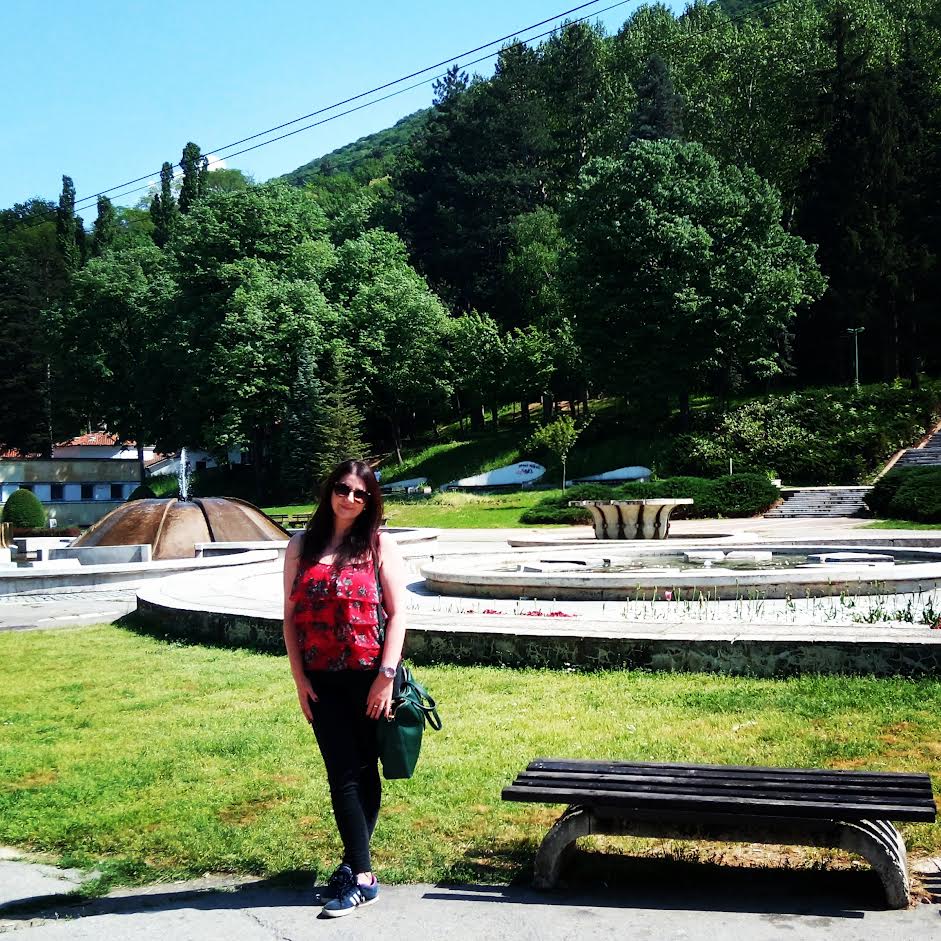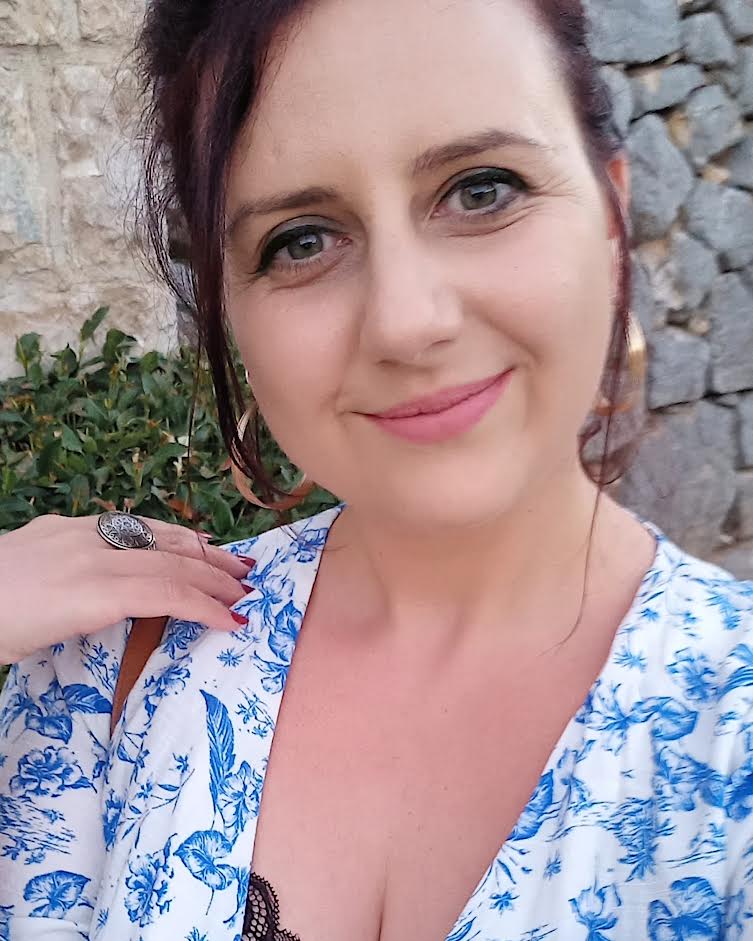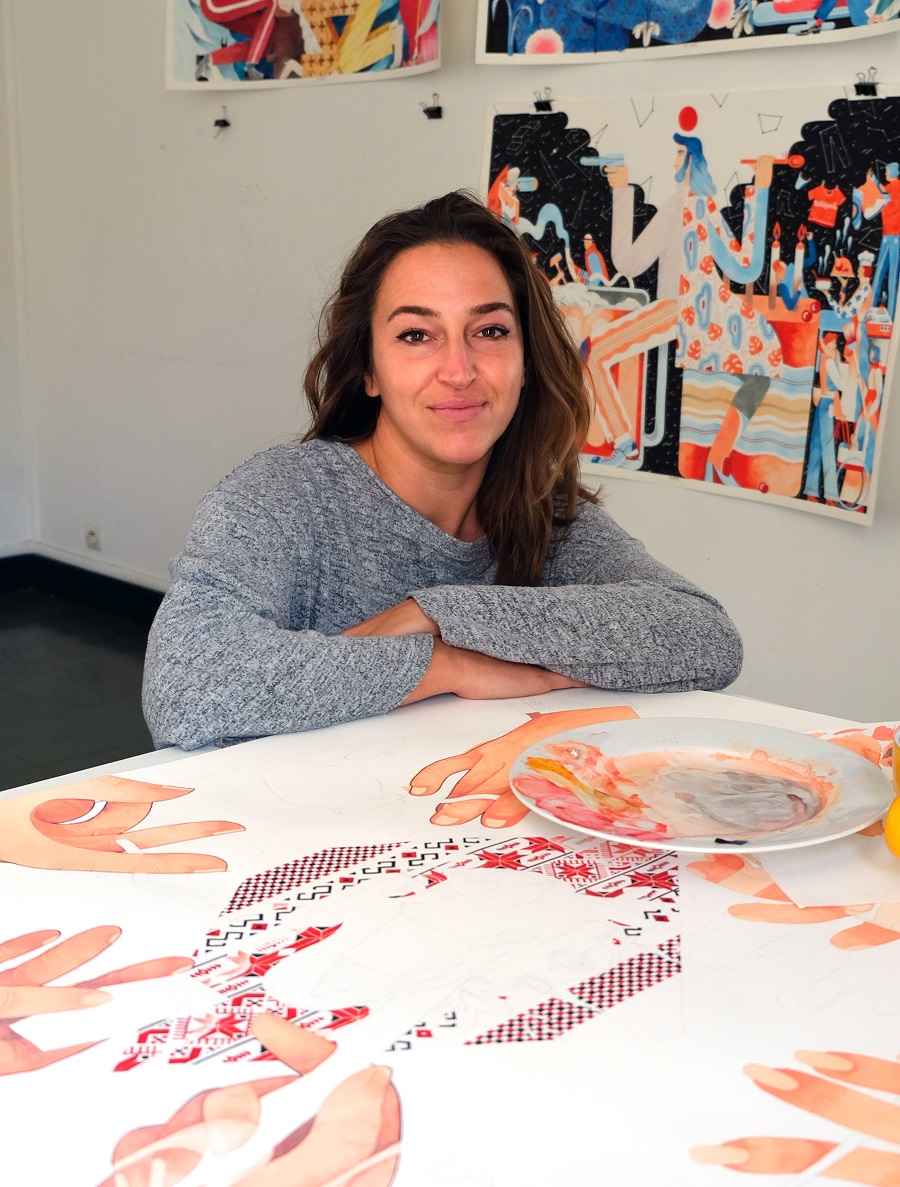Croats Living in Croatia, Earning Abroad: Martina Lucic from Svirce, Hvar
December 22, 2022 - The Croatian dream - to live in Croatia and get income from abroad. Meet the locals who are living that dream, and find out how you could, too, in a new TCN series. In the second in the series, meet Matina Lucic, who is enjoying life on her laptop in the Hvar wine village of Svirce.
Croatia, great for a 2-week holiday, but a nightmare for full-time living unless you are very rich, so the perceived wisdom goes. The Croatian dream is to live in Croatia with a nice income from abroad, as many foreigners and remote workers do. For Croatians, if I read the comments in my recent video, Croatia is the Best Place to Live: 8 Reasons Why (see below), salaries are too low and people are forced to emigrate in search of a better life.
While there is definitely an element of truth to this, it got me thinking. The era of remote work is here, and the workplace is increasingly global, with a labour shortage for many skills. It doesn't matter if you are from Boston or Bangladesh if you have the skills, desire, and work ethic, and are able to work remotely online. And while it is certainly true that salaries in Croatia are low, what about the opportunities that the global online marketplace offers? If foreigners can find ways to live in Paradise and work remotely, why not locals? Curious, I posted this on my Facebook and LinkedIn yesterday:
Do I know many Croats who are living in Croatia, but working remotely for international companies who would be interested in being part of a TCN interview series showcasing living in Croatia but earning online, including advice to others on how to get started? It could be an interesting series. If interested, contact me on This email address is being protected from spambots. You need JavaScript enabled to view it. Subject Remote Croatia.
Some 15 emails - and several inspiring stories - later, and I think we have the makings of what could be a rather interesting series, Croats Living in Croatia & Earning Abroad. Next up in the series, Martina Lucic in the village of Svirce on the island of Hvar.
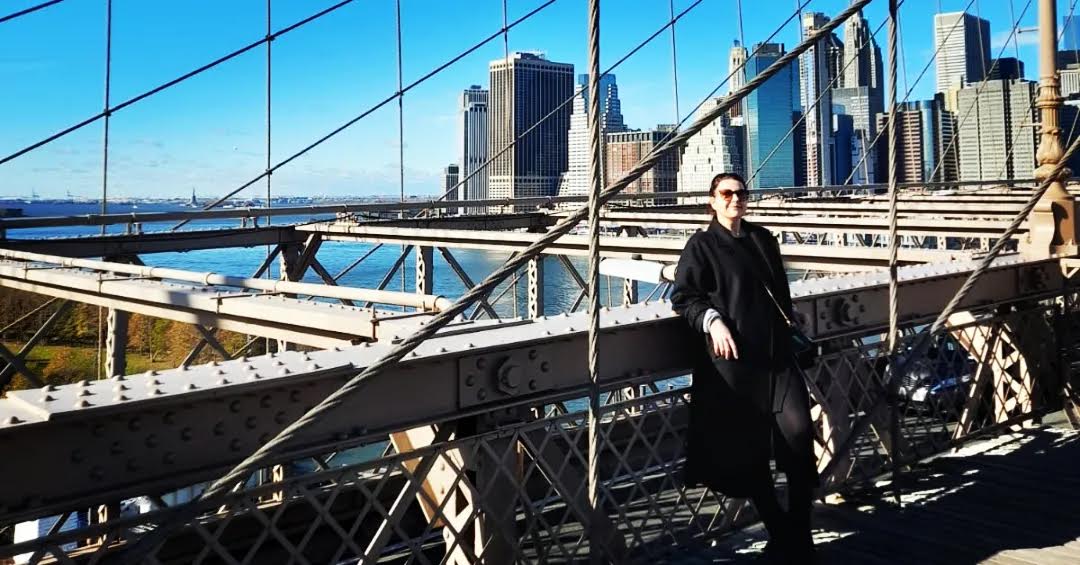
My name is Martina and I come from a small village called Svirče, located on Hvar island. I left Svirče when I was 18 and went to Zadar where I spent almost 9 years. I got my M.A. in French and German Language and Literature at the University of Zadar in 2012. In the meantime, I started my PhD in Humanities at the same university and I am in my final year. In May 2015 I got a job at Amazon in Bratislava, Slovakia where I stayed until March 2022. After getting hired at a UK company called Brainlabs as a PPC Consultant (Digital Marketing) and getting a remote contract, I came back and now I am one happy remote employee.
Many Croats are emigrating but you not only chose to stay, but managed to achieve the Croatian dream - living here and working for an international company. Tell us how you did it.
It was inevitable as I could not find permanent employment in Croatia after I finished my M.A. studies. I speak a couple of languages and I could find a job in tourism, but I wanted a steady salary and a normal work-life balance. I have a huge experience in tourism as I started working in the summers when I was 15 but I could not imagine doing that my whole life. Customer service at Amazon was horrible but I was doing some extra activities like training new hires so I got to do some travelling - I spent a week in Regensburg, a week in Berlin, three weeks in Bangalore, India, and I had so much fun as a trainer. After my department got shut down in Bratislava, I got a position at Amazon Ads. I did not know anything about it but I spoke German fluently. So my ex-boss hired me, taught me everything and I realised that I loved that job. But I was not happy in Slovakia and I felt like it was time to go home. I missed my family, pets, island, sea, and climate so when I got an offer from Brainlabs, I accepted it. They contacted me through LinkedIn. My main condition was a remote contract and they allowed it so here I am.
Looking for jobs upon graduation can be a challenging task. How challenging was it for you to get where you are today - it must have taken a lot of determination and rejection.
Oh yes - I remember sending tons of emails with my CV attached and asking for a chance to prove myself and then getting no response. It was really hard as you need to pay for the flat, utilities, food. I could only dream about buying new clothes, make-up, travelling. As I said, leaving Croatia was inevitable for me.
If you can do it, presumably others can too. Are you aware of others who have had similar success, but maybe in different industries?
Of course - I have met many people while living abroad. Some of them came back and started families, some went to other countries and are not planning to come home before retirement.
Everyone can do it, but one needs to be prepared for a struggle, failing, sacrifices. It is not easy, but it is worth it when you take a look at the bigger picture. Eyes on the prize and keep going.
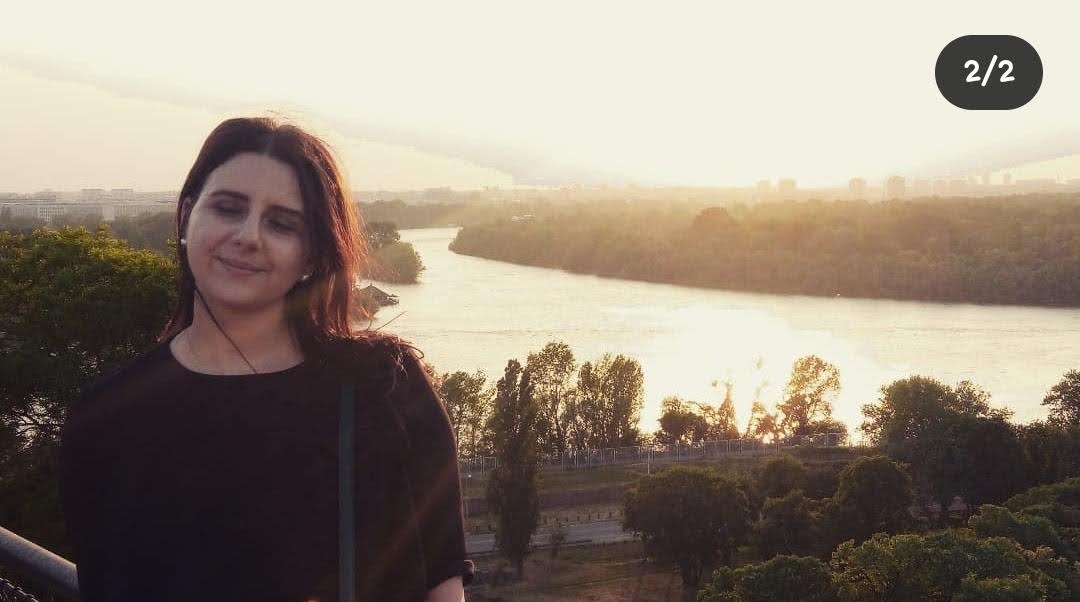
What is the general feeling among young people in Croatia today: Is it possible to have a good life here, or is the grass greener on the other side?
Everything is so expensive nowadays and our salaries are not sufficient so it can be very challenging. This is a beautiful country and it has huge potential but we depend too much on tourism. The grass is not greener on the other side. It is nice to go abroad for a few years, gain some experiences, meet new people, but only if you can learn skills that will help you have a good life here in the future.
Apart from corruption and nepotism, low wages are often cited as a reason to emigrate. But with the remote work revolution, as your example has shown, as well as the influx of many foreign workers to the likes of Rimac and Infobip for example, show that a good quality of life IS possible in Croatia. What are your thoughts on that?
Absolutely. We need to let foreign companies open their offices here, government could perhaps reduce taxes for them and let them hire our people. I do not think that any young person would leave Croatia if they would have the possibility to grow professionally and earn a salary for a decent life here.
What advice do you have for others who would like to stay in Croatia, but have no idea where or how to find a possible remote work job or business as you have managed to do?
Never stop learning and gaining new skills, grow your LinkedIn network, and have realistic expectations. Once you land a job, work hard to prove your worth and your employer's trust. In the meantime, while waiting for a chance, do not sit on the couch and just wait. That is the worst thing you can do. While waiting for your dream job, you can work in customer service, shops, gas station, etc. You'll always learn something new, earn some money, meet new people, and you never know what that experience can bring you. Croatia has a 15 days notice period so you can always leave but also do not change your job too often.
Three reasons you decided to stay in Croatia, and the one thing you would like to change in this country.
Reasons to stay:
1. My family and my friends;
2. Enjoying mild climate in Dalmatia;
3. Possibility to speak Croatian after work;
One thing to change:
1. Too low wages and lack of possibilities to grow professionally
****
Thanks Martina, very inspiring, and congratulations on all your success.
You can follow the rest of this series in the dedicated TCN section here.
If you would like to contribute your story to this series, please contact This email address is being protected from spambots. You need JavaScript enabled to view it. Subject Remote Croatia.
****
What is it like to live in Croatia? An expat for 20 years, you can follow my series, 20 Ways Croatia Changed Me in 20 Years, starting at the beginning - Business and Dalmatia.
Follow Paul Bradbury on LinkedIn.
Subscribe to the Paul Bradbury Croatia & Balkan Expert YouTube channel.
Croatia, a Survival Kit for Foreigners is now available on Amazon in paperback and on Kindle.

Meet Slavonia 365, Full of Life - Iva and Mihovil of Castrum Gin
December 21, 2022 – Meet Slavonia 365, full of life. A year ago, TCN started Vukovar 365, the new series to show that there is life in the east of Croatia every day of the year. After Vukovar reigned the stage for a while, it is time to go beyond and tell more inspiring stories of Slavonia. For our exciting opener, meet Iva and Mihovil of Castrum Gin.
This young married couple worked in marketing and law in Zagreb, jobs they loved, but they decided to return and chase their dreams in their tiny home village of Kaptol near Požega. And they are doing so while sipping on some top-quality Slavonian gin. We spoke to them to find out how they do it, what inspired them to go gin instead of rakija, and why everyone should consider at least visiting Slavonia.
Introduce the people of Castrum and tell us about its visual identity.
We are Iva and Mihovil, a young married couple who started producing craft gin a year and a half ago in a small town at the foot of Papuk, Kaptol. Mihovil is a lawyer by profession, and I am an economist. Although we loved the jobs we did in Zagreb, we decided that we would prefer to live in a quieter place in the future. We both come from Slavonia, and Mihovil has been involved in the production of wine and brandy with his parents since he was a child, so distillation was a familiar concept to him before we ever decided to run a business with distillates.
Castrum is the name for two types of gins we produce - London dry gin and Barrel-aged gin. Its name was inspired by the medieval fortress that dominates Kaptol, whose shape is called a castrum. The shape of the fort is hexagonal with four associated towers, which we also used for the shape of our label. The logo mostly reminds people of lace, but it's actually a faler - an ornament from the horse bridles of Hallstatt warriors who lived above Kaptol in the early Iron Age. Falers were excavated precisely at the Kaptol-Čemernica archaeological site near our distillery.
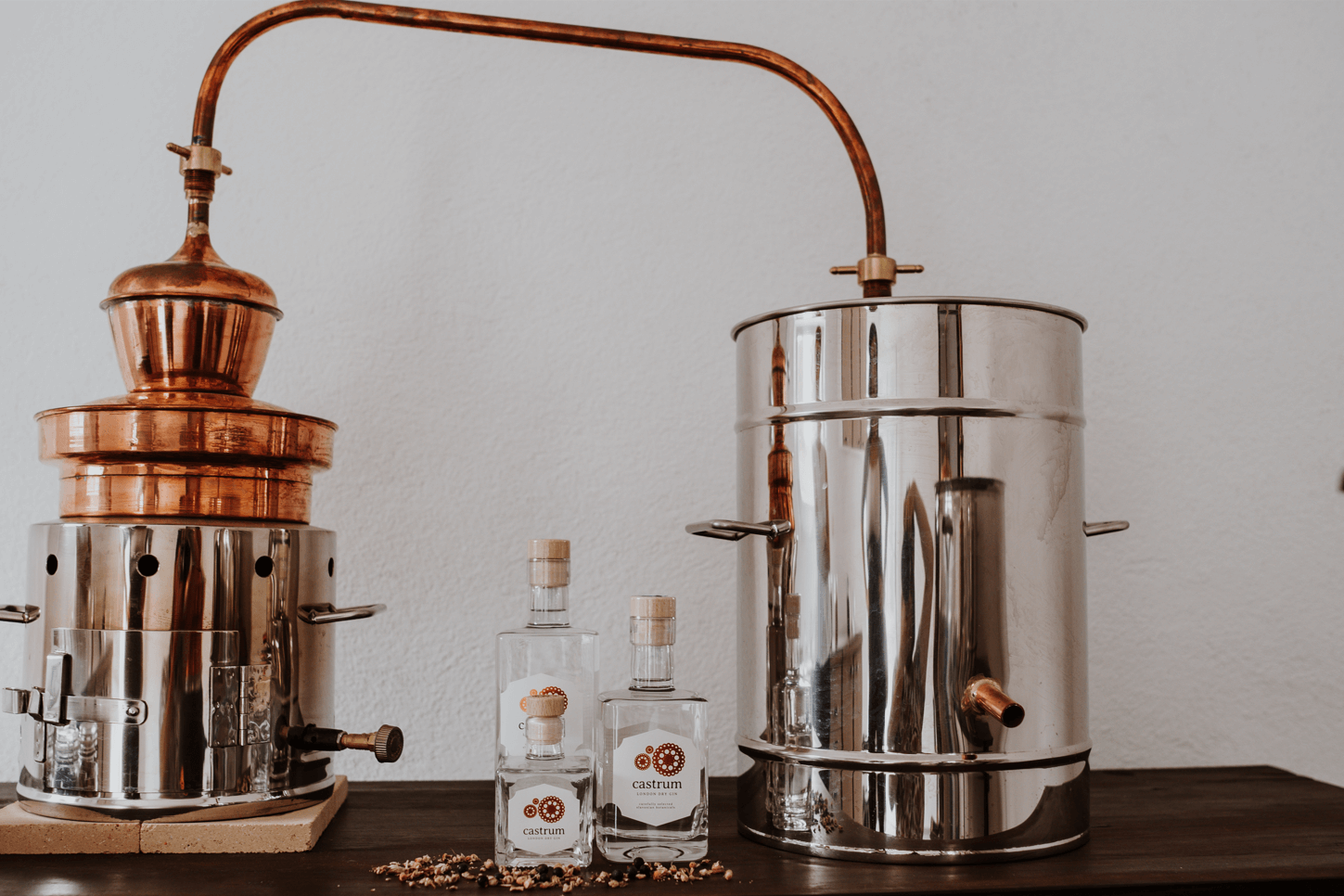
What inspired you to produce gin and not a more traditional drink like rakija? Tell us about your journey.
Gin is a drink we have both loved for a very long time, and we have tried many different types and brands. As for gin as our first distillate choice, it was carefully chosen. When we started thinking two and a half years ago about doing something that would allow us to make a decent living in Slavonia, we knew we needed an idea that would set us apart somehow. The idea of gin was born - precisely because it would be a somewhat "logical" sequence if we started to produce rakija in Slavonia and moved back from the big city, but I'm sure the whole story then wouldn't have been half as interesting.
Some new products are coming, which and how will they be special?
We plan to produce two types of rakija, quince and viljemovka, but before that, we will market pelinkovac (bitter wormwood liqueur) with an interesting name. That one will also be interesting due to ingredients associated with Slavonia, which are not typical for pelinkovac itself. We have a great desire to age a real Slavonian whiskey as well.
You have a gin garden; how does that work? Where do your visitors usually come from?
Our entire distillery is housed in an extension of my husband's parents' home. Since we would also sell our gin there, we created a small cozy area in the basement with a table and six chairs where our guests can sit when they come to shop or for a tasting. At that time, we did not think that a larger group of people would want to visit; we predicted it in the distant future, but it came very quickly. Since we still need to design a larger space for tastings, we came up with the idea of a gin garden during summer. Then the entire lawn in our backyard is occupied by pallets and old things from our grandparents' houses - armchairs, sewing machines, old irons, etc. It is a unique experience in the evening since the whole setup is between apple and pear trees, where we hang fairy lights, which makes it beautiful in the summer evenings. The gin garden opens when the temperatures make spending time outdoors comfortable, usually from the end of May until mid-September. Visitors come to us from all parts of our beautiful country, mainly from Zagreb. We are glad our location is becoming a top choice for weekend trips. There are many tourists in summer, but their number increases significantly in autumn and spring.

How did the fact that you are located in the east of Croatia affect your business?
It had a favourable effect on us, probably because, by returning to Slavonia, we were able to place a very trendy drink on this market, which also quickly found its place under the sun due to its quality.
You are a marketing expert. It seems that Castrum and Slavonia are an inseparable duo. Tell us about this symbiosis.
Ah, Slavonia without Castrum as a gin brand has indeed existed all this time, but a castrum has been standing there since the Middle Ages! During our brand design, we were guided by the idea that our entire product would tell a story - from the ingredients themselves to the connection with the location. I believe that to be very important, it gives personality to the brand, and people connect with it more easily. We produce gin in Slavonia, so we made sure to use ingredients that are characteristic of the area. In our gins, those are elderberry, black mulberry, and grapevine. By returning to Slavonia, we also wanted to work on promoting our destination. I think that by connecting branding with history, we have created a wonderful symbiosis that ultimately offers a tourist experience.
Tell us about tourism in that part of Slavonia - is there tourist potential, and why should everyone visit?
There is significant tourist potential here, and I am glad that this potential is being exploited more and more. Many people have visited our distillery from all parts of Croatia, as well as from abroad. We are happy to host ‘our’ people, who went to Germany, Austria, Switzerland, and even Sweden to earn their living. They somehow get particularly emotional since they wish they could have stayed in their hometown and done something which would provide them with a good life.
There are many reasons why to visit Slavonia. Untouched nature is undoubtedly one of them. The forest park Jankovac is beautiful in all seasons; there are so many cycling and walking paths; our entire region is full of excellent wines and wineries that everyone should visit. There are also many educational places, and there is plenty of content for the youngest.
Having come back, we completed the story of the "return" of our entire team. We were eight enthusiasts who wanted to show our area to more people. We all lived outside Slavonia at one point, and some even on another continent. We designed the event "Ideš i piješ" (Drink as You Go), which works according to Wine and Walk principles. Participants walk 12 kilometers through Papuk and meet local winemakers and distillers. This year was the second in a row, and we can say that the interest is huge. Registration fees were sold out in just ten days, and our inbox was full of questions about whether other places would be open. Slowly but surely, Slavonia is finding its place on the must-visit map. I think that the pandemic also contributed to this. We were limited in terms of travel, so we turned to travel in our own country. At least something beautiful came of such an ugly crisis.
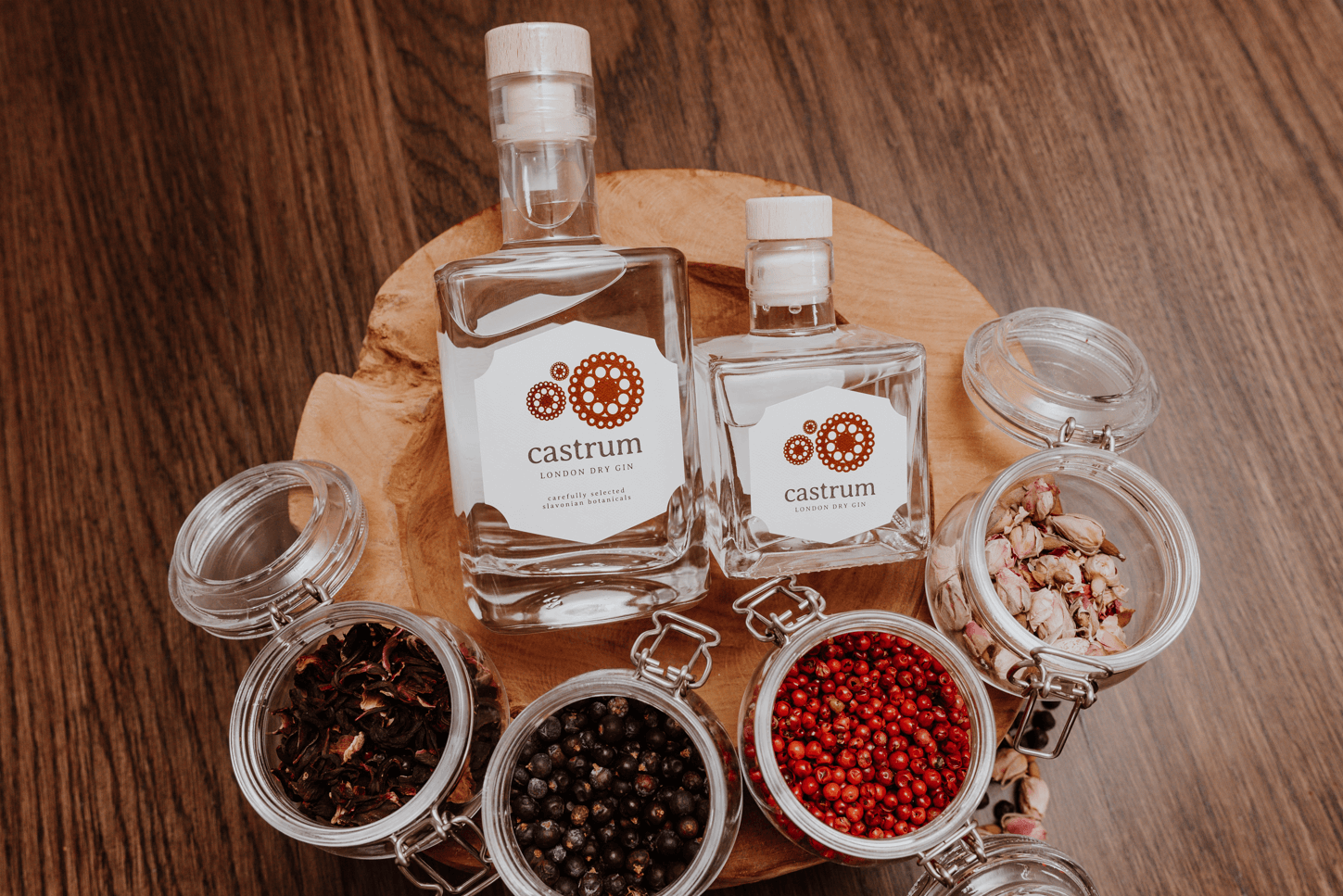
Where can we find you and your product, how long does delivery take? Are we late for Christmas shopping?
So far, we have yet to enter large retail chains, so our products can be found in smaller specialised stores. A list of them can be found on our website, through which our products can be ordered. Delivery takes 1-3 working days. Of course, that deadline could be extended these days by a day or two. As for being late for Christmas shopping, I think it's never too late for good presents!
For more, make sure to check out our dedicated Lifestyle section.
Challenge Accepted: Let's Talk Croatian Language Horrors
December 21, 2022 - This is certainly the most comprehensive, as well as one of the most educational, replies to content I have posted online in the last 10 years - with thanks to Anamarija Pandža for this superbly (and humorously) explained introduction to the wonderful world of Croatian language horrors.
I have had a LOT of reaction to my blogs (and now vlogs) over the last 11 years since I started writing about Croatia, but I can't recall anything quite like this.
I recently started a YouTube channel called Paul Bradbury Croatia & Balkans Expert, a place where I am looking at life here over the last 20 years, and I have been stunned at the level of interest and engagement. The first 1000 subscribers (needed for monetisation) came after just 11 videos, and I have been enjoying interacting with my growing audience. It is the start of what could be quite a fun journey. If you want to subscribe to the channel, you can do so here.
One of the more popular videos has been this one above, 25 Most Common Mistakes Croats Make Speaking English. It was great to get so many messages from Croatians saying that they had learned something from the video (you are welcome), as well as the inevitable trolls demanding to know why I don't speak Croatian after 20 years here (hrvatski je svjetski jezik kojim govore samo najpametniji ljudi. Nisam toliko pametan, trudim se). On one of the comments, I for one would be keen to come across a similar article pointing out common mistakes foreigners make in Croatian.
And then, last night, I received this...
Hi Mr. Paul,
I don't even know how to start this email. So, let's just cut to the chase.
I recently came across your video on the 25 Most Common Mistakes Croats Make Speaking English. I liked it a lot. I found it intuitive and decided to accept your challenge in my somewhat perky way.
Why? I love writing. I love the Croatian language and orthography. I work as a freelance translator (and proofreader and content writer etc.), mostly for Booking.com, and I am experiencing a phase of decreased number of projects at the moment so I finally got time to write something that truly makes me happy. Also, I know my English is far from perfect, so I usually avoid writing in English. This is me leaving my comfort zone (big time).
I am sending you this as a sign of appreciation and acknowledgment of your video. But also to thank you for what you're doing for the promotion of our country and for fighting our mutual 'enemy':the National Tourist Board. This is actually what brought me to you and Total Croatia News. That requires some really steady nerves (the uhljeb story, I mean). Respect. Hope I will be able to get to your Nirvana stage someday soon. :)
In conclusion, please find attached 'the novel', I mean my article: Challenge accepted: let's talk the horrors of Croatian language. I do not expect you to publish it. You can just read it, since I am under the impression you value these things. If you do want to publish it, I will not mind. However, it is going to need some good editing (and cutting probably). Mother tongue interference is strong with this one.
Anyhow, I hope it will be at least somewhat useful to you, as was your video to many Croats and me personally.
Apologies for the length of the document. I just do not know when to shut up.
Kind regards,
Anamarija
CHALLENGE ACCEPTED: LET'S TALK HORRORS OF THE CROATIAN LANGUAGE
Recently I came across a YouTube video by Paul Bradbury, whom I basically know for sharing probably the same ''passion'' towards the Croatian National Tourist Board as I do. The video was related to language matters, not the legal and uhljeb ones. To cut a long story short, I really appreciate what he is doing for Croatia and its tourism, so I accepted his challenge and decided to write a piece on 20 mistakes non-native speakers (and not only them) make when speaking Croatian. To be quite honest, probably 90% of the listed mistakes are made by the majority of Croatians too. Anglicisms and pseudo-anglicisms are all the rage nowadays, but that is a completely different story. As Paul put it: if you know English, you'll do well in Croatia. Don't you ever get discouraged by something as padeži? These are not worthy of your tears.
Paul is so much more hip than I am, and he made a video. I did not make a video. Firstly because - as many others do - I hate the sound of my own voice on audio and video recordings. Secondly, I'm an old-fashioned girl. If I can make someone read in this day and age, I will do it. And I make no apologies.
Croatian is widely considered one of the hardest languages to learn for English speakers, right after Mandarin and the languages of Finno-Ugric language group. Speakers of the latter language group struggle with an even greater number of grammatical cases than we do. Imagine that horror!
Here are some practical language tips on how to excel in Croatian and avoid some common mistakes. So common that a significant percentage of Croatian people aren't aware of making those mistakes either.
1. Shall we start with light and trendy topics? Let's talk about THE beverage: pivo/beer!
So is it piva or is it pivo? The only correct form is pivo. I can understand how fond some men are of both beer and female gender so they use every possible occasion to draw comparisons between these two, even if only by playing with grammar matters. However, grammatical gender is something you cannot change, not even in the 21st century. Pivo is of neuter gender, not the female one (piva) and that is a fact. To all the men out there: you are no less a man if you address it in the neuter gender.
2. The right to enjoy one's beer in peace can be considered a matter of human rights, don't you agree? Well, among non-native speakers, human rights are often translated in Croatian as čovječja prava. Hard to believe it since you literally need to break your tongue to pronounce it, huh? This is, however, a literal translation from English. The only correct form in Croatian is ljudska prava (derived from the noun ljudi = people).
3. When someone buys you a beer, it is appropriate to thank him/her. So, you'll probably say something like hvala lijepo….And that is awfully polite of you, but is not correct in Croatian. You should always say hvala lijepa (because hvala is of female grammatical gender).
4. Let's stick to means of expressing our gratitude for a little while. This one is hard to grasp, even for Croatians. It makes all the difference in the world whether you will zahvaliti or zahvaliti se. E.g. When someone offers you a gift, there are two possible scenarios, and in both, you can use either zahvaliti or zahvaliti se. When you decide to accept the gift and express your gratitude, you will most likely say something as: zahvaljujem, divno od tebe/thank you, that is so lovely of you. However, if you decide to politely decline it, you will most probably say: zahvaljujem se, ali ne mogu to primiti/ thank you, but I cannot accept it. Also, when you're firing someone, and you want to gently deliver the news, but you don't have a cute niece around you to sing a Frozen tune along (bad joke, I know), you will use the following wording: nažalost, moram vam se zahvaliti/ I regret to inform you…
5. Now on homographs and homophones and context (they have nothing to do with your sexual orientation… or they might, who knows). So what does it really mean kako da ne? Does it mean yes, of course or the hell no? Knowing the difference makes all the difference. But the trick is: it can mean both. I can understand how people get lost in translation so easily with this one. The trick is to pay attention, depict the pitch of the voice and observe the face. If you have a Grouchy Smurf in front of you, it's probably a hell no. If you get a smiley face, or even doubled kako da ne, kako da ne, you got yourself a definite yes, sir/madam.
6. And now to make things complicated. Padeži give us hell. I know. But, one of the seven musketeers is especially avoided amongst non-native speakers of Croatian, and it is an instant traitor. It's the vocative. It's wrong to say: Ej, Ivan!/Hey, Ivan or Ivan, dođi ovamo/ Ivan, come over here. Instead, you should say: ej, Ivane and Ivane, dođi ovamo. Vocative asks for a suffix. There are exceptions, however. Of course, there are. Those exceptions are names such as Ines, Nives, Karmen etc.
In this article, I am discussing mainly spoken language, but there is one other distinction in written language when speaking of vocative: it always comes separated with a comma.
7. To stick to names, let us discuss possessive adjectives. This is a huge mother tongue interference from English. One should never say prijatelj od Stipe. You say Stipin prijatelj/ friend of Stipe. Using the preposition od + genitive form is not in accordance with Standard Croatian. Thus, you should always use a possessive adjective instead.
8. How about svoj versus moj? In Croatian, belonging to a subject is expressed through the possessive-reflexive pronoun svoj, roughly translated as one's own. Some call it a super possessive pronoun. That's how we roll in Croatia. So, if you want to say: I am going to my apartment, the wrong way to put it would be Idem u moj stan (although moj means my). Instead, say: idem u svoj stan.
This is an extremely common mistake even amongst native speakers, so don't get discouraged if it takes time for you to develop natural language processing.
9. English loves the passive voice. However, Croatian not so much. Why is that so? Probably because we like to be acknowledged, involved and informed of who did what #MiHrvati. Thus, in English it is normal to say the complaint was made by the employees, but it is not natural to say podnesena je žalba od strane zaposlenika (which you can hear a lot in administrative language amongst uhljebs). Instead, say: zaposlenici su podnijeli žalbu. Just not to make us rack our brains over who did what. Work smart, not hard (what an irony).
10. Okus and ukus. I know! You have to pucker up your lips out there to pronounce it just to end up looking like a fish and ultimately find out you opted for the wrong one. But, it is as simple as it gets. Yet, it gets interchanged way too often. Okus is used when referring to flavour and ukus denotes taste, as in a person's implicit set of preferences. You have good taste = imaš dobar ukus. Saying to someone imaš dobar okus would imply you're a bit more than friends.
11. Changing the subject. So, which team are you: team more or team voda? Have you already found yourself in a situation where you almost felt verbally assaulted by a Dalmatian explaining it to you: it's not water, it's the sea. Potato potato if you asked me. From a linguistic and scientific point of view, you are not wrong. Seawater is still water, just not the drinking type. But sometimes you cannot rationalise things with the people of Dalmatia. So, how to proceed with this one? However you want. This is 'the mistake' that is actually not a mistake per se. It is a battle you cannot win. I gave up fighting a long time ago (don't tell anyone, I have Herzegovinian roots, so I have no right to vote on this one). Yet, I boldly go where only Herzegovinians and the good folks of diaspora have gone before and I get to choose. Sometimes I enter the water, sometimes I enter the sea.
12. Let us shortly get back to grammatical cases again. Of all the cases in Croatian, instrumental is probably the easiest and most logical to learn amongst non-native speakers. However, there is something where most of them stumble. To preposition or not? It should be easy: 1) when instrumental is used in the context of explaining a tool or the means used to accomplish an action, you must leave out the preposition; 2) when talking about company and the unity of 2 entities, you will most definitely need a preposition. Thus: pišem olovkom/ pišem s olovkom (I am writing with a pencil), putujem autobusom/ putujem s autobusom (I am traveling by bus) BUT Putujem s Barbarom (I am traveling with Barbara) and volim palačinke sa sladoledom (I like crepes with ice cream).
13. Vi ste došla. Croatian is already complicated enough, so let's not complicate things where they are quite so simple. When addressing someone informally you need to pay attention to grammatical gender. However, this is not the case when using the formal Vi form. The ending is always the same both for female and male grammatical gender. Gospodine Smith, vi ste došli/ Gospodine Smith, vi ste došao. Gospođo Smith, vi ste došli. Gospođo Smith, vi ste došla.
14. Ukoliko/ako = if: you shall not break your tongue in vain! Save your breath. First, I hear you on how hard it is to pronounce ukoliko. Good news is: it's a common mistake to misuse ako and ukoliko among native speakers as well. The secret to forcing usage of ukoliko lies in the fact it sounds more erudite. However, ukoliko must be used only in combination with utoliko. In all other cases, you should use ako. They practically mean the same thing. Ukoliko ti plaćaš, utoliko idemo na kavu. Ako ti plaćaš, idemo na kavu. If you're paying, we'll have coffee. To conclude: when in doubt, use ako.
15. The next point is strictly a spelling matter. There is a distinctive difference between writing down numbers in Croatian and in English. There is no such thing in Croatian as a decimal point (used to separate a whole number from the fractional part of the number). Instead, we use a decimal comma. Thus 67.8 EUR or 67,8 eura. When it comes to small amounts, it does not seem like a big deal. However, when talking big money, it can make all the difference in the world. Write wisely.
16. When it is not padeži time, it is glasovne promjene time. Both can be summed up as headache times. But there are things you just have to learn and learning is a long and painful process.
- Sibilarizacija, known as Slavic second palatalization, is the sound change where k, g and h when found before i develop into c, z, s.
Why is this important to us? Because this is the reason why it is wrong to say u ruki mi je, instead of u ruci mi je (it is in my hand).
- Slavic second palatalization is a sound change where k, g h when found before e develop into č, ž, š.
In practical usage, it means it is wrong to say hej, momak/ hey, boy. Do not get fooled by the Dalmatian dialect where you probably hear ej, momak a lot. This is due to the fjaka state of mind. Everything is a bother, even using sound changes. Instead, steal the show and say hej, momče.
17. I know this is already a lost battle, but I am using every possible occasion to beg you: please, do not use the term event when speaking Croatian. If Croatians want to sound important, let them be. However, the original Croatian word for the megapopular event is događaj or događanje. I know it is painful to pronounce it, but I want you to know that for each time you use the term događaj instead of event, someone on this side of the screen will love you more. In case of public writing, the love doubles. Cross my heart and hope to die.
18. It's Christmas time. It's welcome parties time. Many are heading to the capital of Croatia these days. In colloquial language, it is popular to say idem za Zagreb (I am going to Zagreb). However, this is wrong. You should always say: idem u Zagreb. Motion verbs ask for the preposition u instead of the preposition za (preposition u > preposition za).
19. I know the Italian language sounds more romantic, but when you order prosecco in Croatia - you get bubbles. If you want to try an indigenous product, ask for prošek. Many confuse Prosek with Prosecco due to a lost in translation moment. However, the difference is major. Prošek is a thick and syrupy still dessert wine. Thus, do not worry about translation and the labels of the protected designations of origin and just taste it. Enjoy the simplicity.
20. Ah, I saved the last dance for you. There is a popular opinion that the usage of particle/conjunction groups da li and je li is a matter of major distinction between the Croatian and Serbian languages. This is not necessarily the case. However, the usage of the group da li is not in accordance with the normative rule of Standard Croatian. Thus, to form an interrogative sentence, you should opt for verb + particle li (commonly known as je li group) instead of da li. E.g. Da li je to restoran o kojem si mi pričao? Je li to restoran o kojem si mi pričao. However: Da li me voliš? Voliš li me?
You have my respect If you managed to reach the end of the article. Go reward yourself with one pivo now. All jokes aside, Croatian has many dialects and sub-dialects. Many non-native speakers learn the language from online sources created by Croats in the diaspora (where the majority did not learn Standard Croatian) or from locals using the dialect. There you have a root for all the above-mentioned mistakes.
Also, the trait of the Croatian language is that it is rather liberal, more descriptive than prescriptive in nature. For this reason, it does not have one official orthography. Instead, there are many unofficial editions. However, the recommendation is to choose one and aim at consistency.
For all that has been said, do not ever get discouraged by making mistakes. We all make them. Bear in mind one significant difference: it is easier to learn English nowadays with all the variety of learning tools and sources out there. To learn Croatian as a non-native speaker is a true stunt. An admirable one. Do not give up.
****
Wow, thanks Anamaija - I certainly learned a few things (and am still recovering from someone writing a 3,000 word response to one of my videos). I asked Anamarija to tell me a little about her. If you want to contact her, let me know on This email address is being protected from spambots. You need JavaScript enabled to view it. and I will pass on your details.
My name is Anamarija (full name: Anamarija Pandža) and I live in Omiš, the stunning small town I am incurably sentimental about.
I am 50% English to Croatian human translator/ court interpreter/ proofreader/ content writer/ entrepreneur and 50% coffee. Coffee and the sea are the only 2 things I cannot live without. That is, I can - but I choose not to. I'm also a huge fan of words. They are my playground. I use quite a lot of them, both for making a living and to rant for the sake of ranting.
You will find me at the kids table. Always. Utopist. Forever smiling Grouchy Smurf. Forever waiting for a Godot. Also, forever a black sheep wherever I go. In love and hate relationship with this country and its people.
The worst and the best thing you can do is to tell me to give up. That is when the game begins. I never give up. This is why I chose not to give up on Croatia either.
****
What is it like to live in Croatia? An expat for 20 years, you can follow my series, 20 Ways Croatia Changed Me in 20 Years, starting at the beginning - Business and Dalmatia.
Follow Paul Bradbury on LinkedIn.
Subscribe to the Paul Bradbury Croatia & Balkan Expert YouTube channel.
Croatia, a Survival Kit for Foreigners is now available on Amazon in paperback and on Kindle.

Croats Living in Croatia, Earning Abroad: Tea Jurisic from Baska Voda
December 21, 2022 - The Croatian dream - to live in Croatia and get income from abroad. Meet the locals who are living that dream, and find out how you could, too, in a new TCN series. We start with the inspiring and very determined Tea Jurisic from Baska Voda.
Croatia, great for a 2-week holiday, but a nightmare for full-time living unless you are very rich, so the perceived wisdom goes. The Croatian dream is to live in Croatia with a nice income from abroad, as many foreigners and remote workers do. For Croatians, if I read the comments in my recent video, Croatia is the Best Place to Live: 8 Reasons Why (see below), salaries are too low and people are forced to emigrate in search of a better life.
While there is definitely an element of truth to this, it got me thinking. The era of remote work is here, and the workplace is increasingly global, with a labour shortage for many skills. It doesn't matter if you are from Boston or Bangladesh if you have the skills, desire, and work ethic, and are able to work remotely online. And while it is certainly true that salaries in Croatia are low, what about the opportunities that the global online marketplace offers? If foreigners can find ways to live in Paradise and work remotely, why not locals? Curious, I posted this on my Facebook and LinkedIn yesterday:
Do I know many Croats who are living in Croatia, but working remotely for international companies who would be interested in being part of a TCN interview series showcasing living in Croatia but earning online, including advice to others on how to get started? It could be an interesting series. If interested, contact me on This email address is being protected from spambots. You need JavaScript enabled to view it. Subject Remote Croatia.
Some 15 emails - and several inspiring stories - later, and I think we have the makings of what could be a rather interesting series, Croats Living in Croatia & Earning Abroad. We start with a very determined young lady called Tea. Who would have predicted this for an artist graduating from a Croatian university in search of a job? Lesson learned - if you really want it, it is out there.
(Studio at Cite Internationale des Arts in Paris)
My name is Tea Jurišić, and I am an illustrator and muralist from Baška Voda, running a one-woman studio called KVAR Illustration. The first child of five, born in January, from an early age, I have had the urge to see what was happening around the corner. In that manner, I finished the High School of Fine Arts in Split and the Academy of Fine Arts in Zagreb, and continued with my nomadic lifestyle working in Osijek. Before I started my professional artistic career, I worked as a diving instructor for 8 years on the beautiful Croatian coast. When I became a freelancer, I realized everything is possible, so I traveled a lot, and even experienced travelling and living in a campervan with my boyfriend for two years in a row, driving through Greece, Albania, Montenegro, and Croatia. This lifestyle taught me more than all the years of formal education; I learned about different cultures, people, and nature.
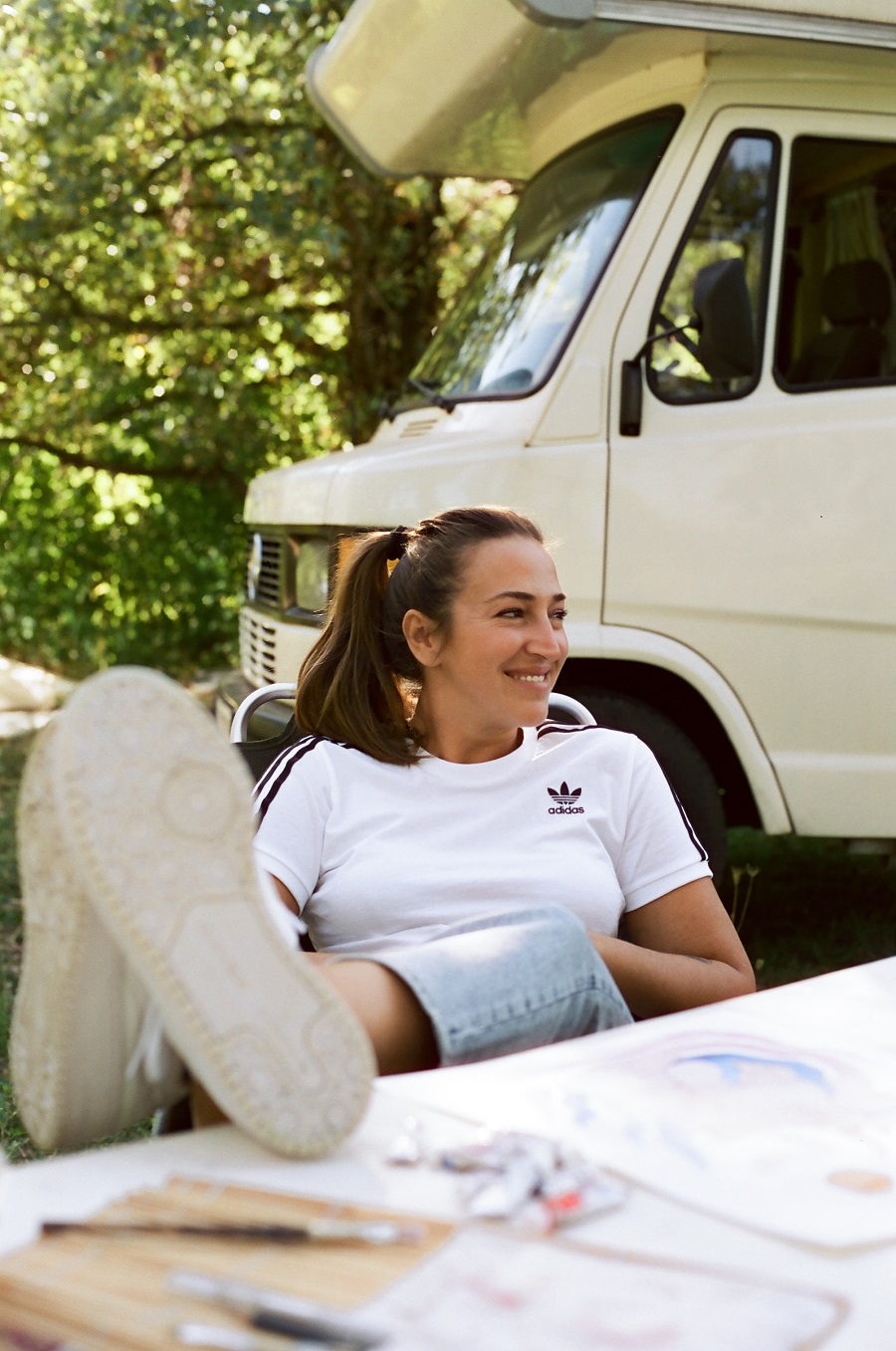
(Campaign for Adidas - 404 Agency)
For an artist, this is an unforgettable experience providing a great amount of inspiration. Last year around this time I spent 3 months at an artist residency at Cite Internationale des Arts in Paris, and at the moment, I am working and enjoying the Hafenkombinat residency in Leipzig. Some of my clients include: Adidas, L'Oreal, Samsung, Beck's brewery, LELO, Wienerinsurance, Adris Group, Ozujsko, and many more.
Looking for jobs upon graduation can be a challenging task. How challenging was it for you to get where you are today - it must have taken a lot of determination and rejection.
During my study, I worked a summer job as a scuba diving instructor in our family diving center on the coast. It was a great job, but I experienced it more as a job, and less as my passion. In the wintertime, I was an assistant at the Academy of Arts in Osijek. After 2 years of working at the faculty, I realized I was not made to educate other people in an academic manner. I missed freedom, and I struggled with money a lot. At one moment, I realized nobody would come to knock on my door with the request: ”Hello, is there an artist living here, we want to work with you?” I built a portfolio and started to send it to a million e-mail addresses. I accepted any work I got. At first, I experienced a lot of disappointment and unpaid hours, but since I am the first child of five siblings as well as a stubborn Dalmatian, I just decided not to get offended by the situation and rejection.
I started my own business at the worst possible time, in the first months of the lockdown, and I didn't get support from the government. That made me even more determined to succeed, and I tried to represent myself everywhere online, I started to “iskakati iz paštete”, as we say in Croatia (literally, to pop out of the pate, or to be everywhere). Step by step, I got a few good offers from good clients, and the turning point was an offer from one fantastic Swedish company to draw illustrations for them. Since then, the tables have completely turned and people started to reach out to me. I started to work with agencies all around the globe, illustrating and joining street art projects. I am still in charge of illustration projects for my first big, Swedish client, and that is one of my favorite things to do.
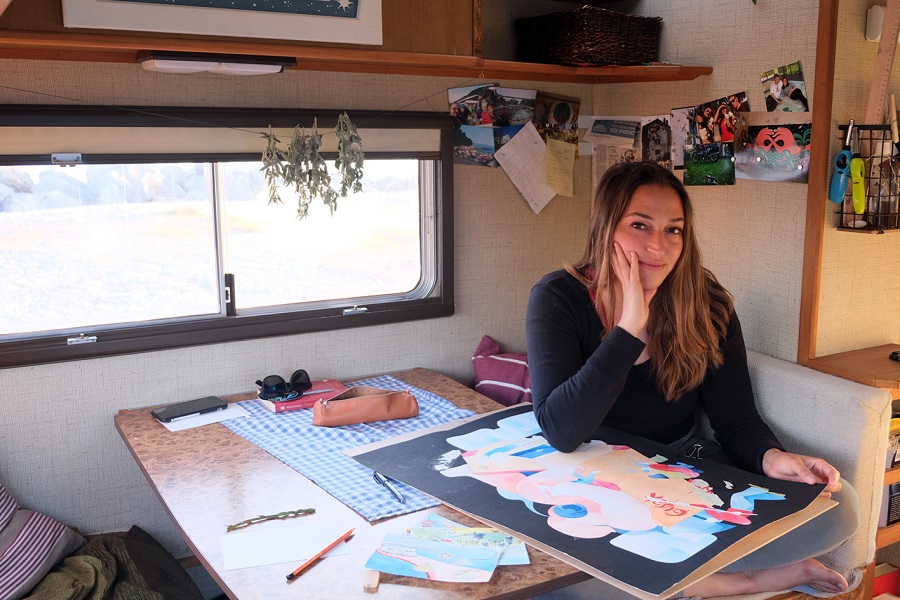
(Tiny studio in the Bercedes benz camper in Greece)
If you can do it, presumably others can too. Are you aware of others who have had similar success, but maybe in different industries?
Of course, but in the Croatian media, you will not hear about them because positive news is not interesting news.You will read about gossip, drama and lying politicians, and watch funny videos of cats and dogs. I think people are trying to escape from everyday problems by soaking in this kind of news, which makes them a little bit passive.
On the other hand, there is a constantly growing sector of many different industries with self-employed people in Croatia, especially IT, marketing, and graphic design...Even in artistic fields, my colleagues started to open businesses and invest time in education about marketing and project writing. This is not something that they are teaching you at the Academy, and that is the biggest flaw of that faculty.
People graduate, and then they are on their own, without mentors and without knowing how to represent and sell their work. However, I have seen positive growth in the last few years. People have had enough, they want to be their own bosses rather than working for companies that would pay them peanuts.

(A recent collaboration with BITE ART & Design Studio Izvorka Juric - Photos DB Izvorka Juric)
What is the general feeling among young people in Croatia today: Is it possible to have a good life here, or is the grass greener on the other side?
Croatian people are sometimes suffering from low self-esteem, which doesn't surprise me since there is a general opinion that they should grab any work offered and that they should be happy only because they have the opportunity to work. Even if that means they are totally unhappy. I think Croatia is one of the best countries in Europe to live in if you have the opportunity to work remotely. I believe Croatia has one of the best business systems in the form of “paušalni obrt.” in that case, tax is very low, and the monthly fee you pay for retirement, health, etc. is negligible in comparison to what you can earn up to 300 000 kunas (40 000 €) annually. I am saying this because people are focused on negativity, and they sometimes simply don't know all the possibilities available. Only 30 years ago, artists had to go from door to door with their portfolios. The Internet is the best thing ever if you use it properly. Do the research, and connect with people; today you can make it from your sofa. How amazing is that?
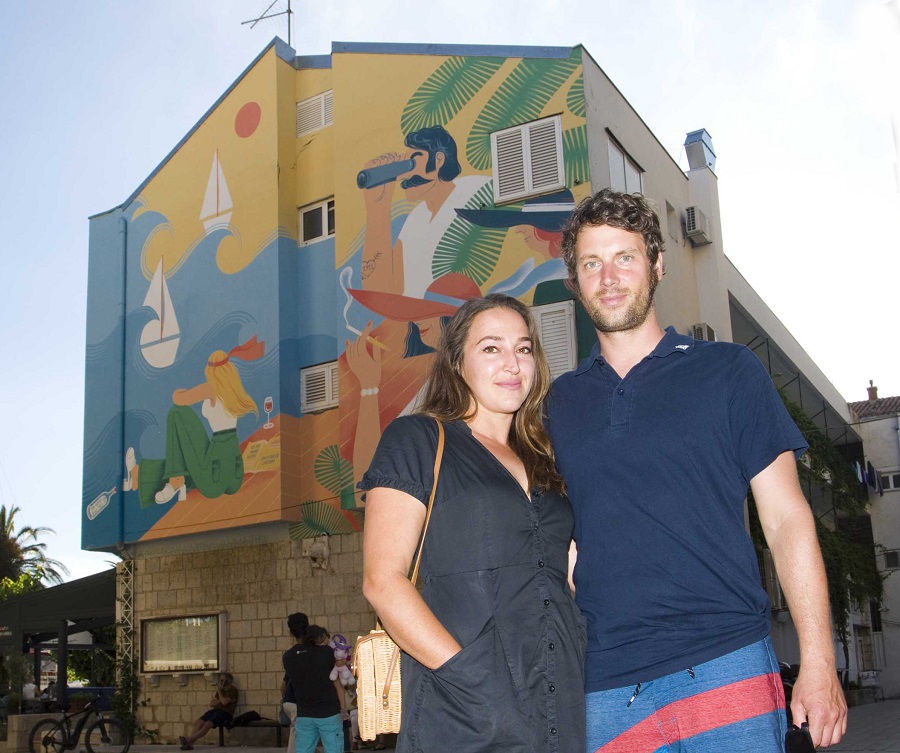
(Mural in Makarska, with boyfriend Ludwig, who assisted on the project - Photo Makarska Kronika)
Apart from corruption and nepotism, low wages are often cited as a reason to emigrate. But with the remote work revolution, as your example has shown, as well as the influx of many foreign workers to the likes of Rimac and Infobip for example, show that a good quality of life IS possible in Croatia. What are your thoughts on that?
My opinion is that Infobip and Rimac are wonderful things that happened to this country. We can learn directly from Rimac's example – a young person who dares to take risks, who has a perfect work ethic, and who cares about his employees because he realizes how important they are. They are a team. Remote work is the future for people who like to explore other business opportunities, apart from mass tourism or being in the HDZ party.
People always think the grass is greener on the other side and that they can earn more money in Germany or Ireland. Although that may be true, in many cases, you will not have a life. I do not see myself spending the best years of my life working from 8 – 17, coming home, and not having the energy for anything else. For me, everything in life should have a good balance – work, enjoyment, and love.
Hedonism is good, and they are teaching us that laziness is a sin. It's not if there is the right amount of it, and in many cases, “laziness” can lead you to the greatest creative solutions. One big part of my work is lying down, sitting, and resting, which for me is a synonym for thinking, because the most important part of my work is the IDEA, the idea how to create an illustration, how to paint, and how to represent the motifs metaphorically. I cannot get these ideas without resting, thinking, and looking like a lazy sloth to other people. That is, however, possible with remote work!
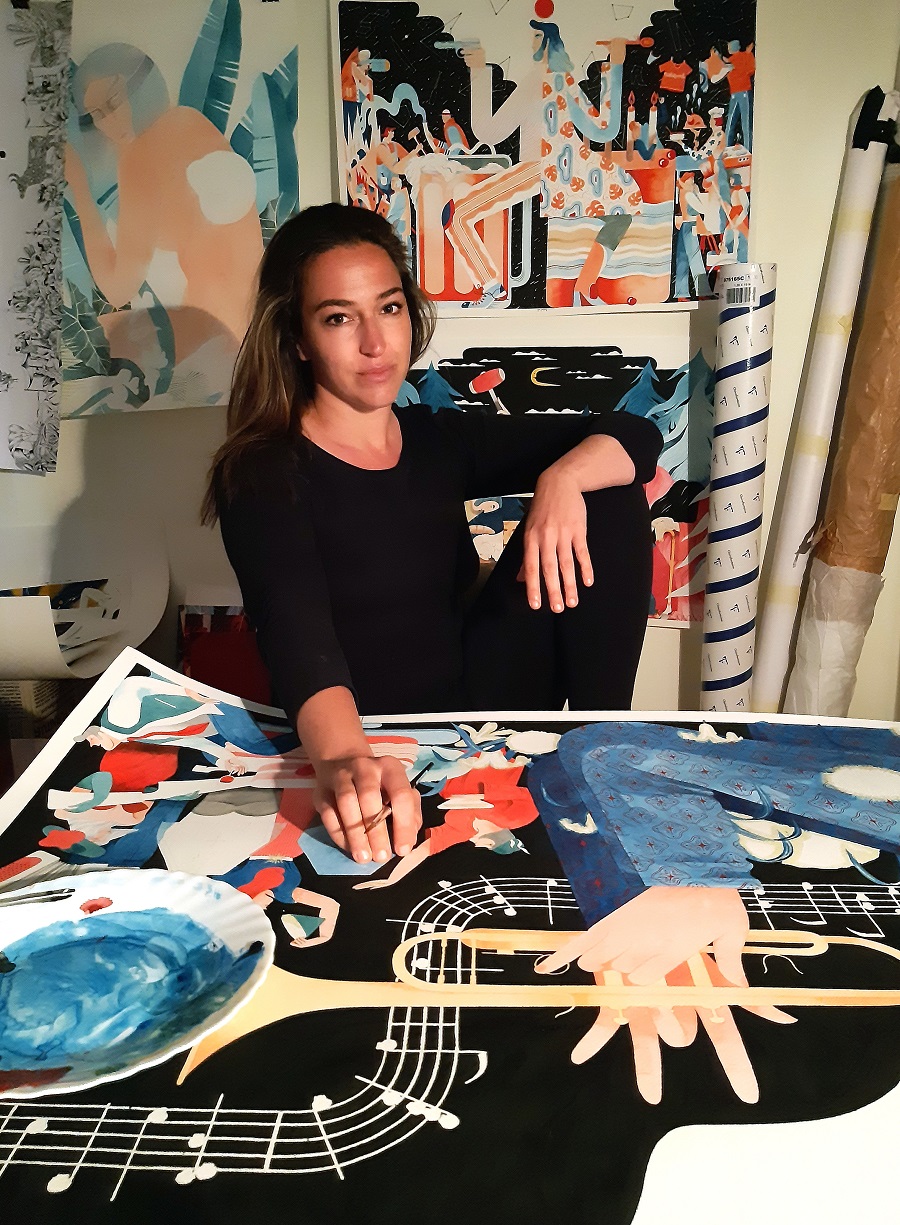
What advice do you have for others who would like to stay in Croatia, but have no idea where or how to find a possible remote work job or business as you have managed to do?
Be ready to invest a lot of time online in research and attempt to connect with people from similar branches. Learn from them. Watch tutorials on how to make an eye-catching LinkedIn profile, and how to present yourself in the best way possible. Confidence is the key. Even if you are not confident at the moment, act like you are, and soon you will become confident. Show a little bit of nerve at the right moment, you will for sure trigger reactions. Think about your unique selling points and how to show them in the best way possible. There are numerous job platforms online, check which one would fit your needs, and the moment you are satisfied with your CV and presentation, start contacting the companies you are interested in. Details are very important, learn how to write a proper e-mail which will encourage potential clients to read it.
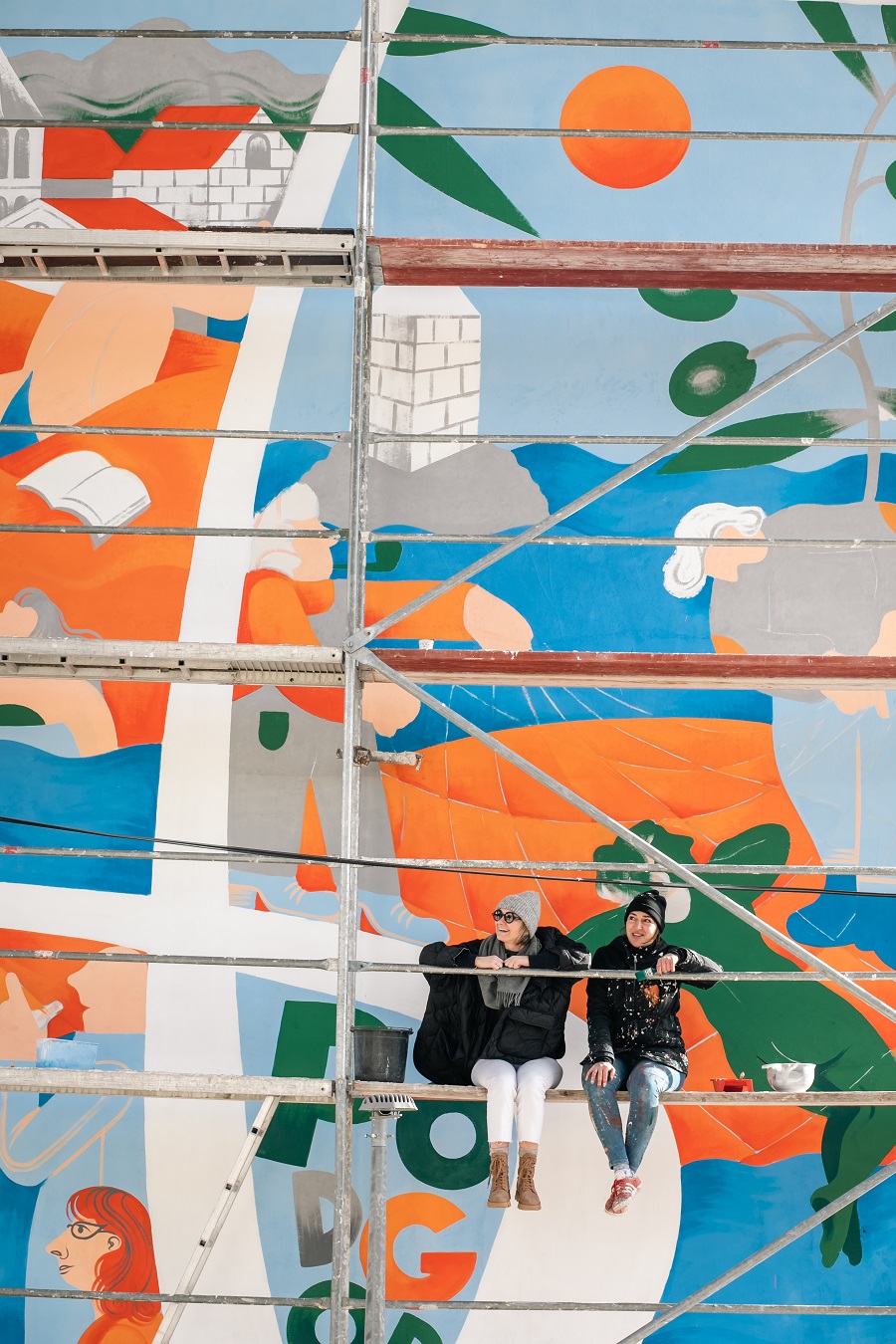
(Mural in Podgora - Photo Dario Odak)
Three reasons you decided to stay in Croatia, and the one thing you would like to change in this country.
1. Breathtaking nature, I come from the Makarska Riviera, which is the most beautiful part of the coast (sorry Istria):)
2. The lifestyle in Dalmatia. When I think of lifestyle, I do not think of having 20 apartments and doing nothing, I think about being a part of hedonism culture, slow, quality living, soaking in the beautiful sun, appreciating nature and the healing sea. Sometimes we do not stop to appreciate the heaven we live in.
3. Ćevapi
I would like to change the general mood of not forgiving other people's success in Croatia. That is one nasty, childish habit among the people here. A lot of them simply don't understand that other, positive business examples can lead to their own growth and new experiences. Successful people are not your enemies but an opportunity to be inspired to make something of your own.
****
Thanks Tea, very inspiring, and congratulations on all your success. You can connect to Tea via her LinkedIn, Instagram, and website.
www.linkedin.com/in/teajurisic/ www.behance.net/kvar www.instagram.com/tea_jurisic/
If you would like to contribute your story to this series, please contact This email address is being protected from spambots. You need JavaScript enabled to view it. Subject Remote Croatia.
****
What is it like to live in Croatia? An expat for 20 years, you can follow my series, 20 Ways Croatia Changed Me in 20 Years, starting at the beginning - Business and Dalmatia.
Follow Paul Bradbury on LinkedIn.
Subscribe to the Paul Bradbury Croatia & Balkan Expert YouTube channel.
Croatia, a Survival Kit for Foreigners is now available on Amazon in paperback and on Kindle.

Zagreb Advent 2022 Bringing Foreign Visitors to Croatian Capital in Droves
December the 21st, 2022 - Zagreb Advent 2022, the first to be held normally since the pre-pandemic advent of 2019, is drawing foreign visitors from across Europe and indeed from further afield to the Croatian capital this festive season, and the more or less constant fog and rain isn't bothering them.
As Poslovni Dnevnik writes, aside from those of us who make up the capital's local population, Zagreb Advent 2022 is also turning out to be real lure for all sorts of guests from abroad. Although the weather conditions (rain and fog) haven't been exactly favourable for visitors, there's no shortage of tourists here in the city. It is the foreign guests who are driving spending and consumption most of all, because if they weren't there, Zagreb Advent 2022 would already be in the red, at least according to a report from HRT.
The always popular ice skating rink on King Tomislav Square is a little bit different this year than it was back during previous years. Due to the ogoing rain, the number of visitors is - at least for now - significantly less than in the years before the global coronavirus pandemic shook the world.
"So far, the weather has been really awful. The first two weeks we had constant rain and maybe only two dry days. Despite this, there are really a lot of tourists in Zagreb, we can feel that at the Ice Park as well. So, regardless of the weather, the results are relatively alright,'' stated the organiser of the city's "Ice Park" Slavica Olujic Klapcic.
One hundred metres away, on Strossmayer's Square, lies the center of Zagreb Advent 2022's gastronomic offer. Most of the visitors there are foreigners.
"We can say that everything except the weather conditions, which aren't very favourable to us, is actually great. There are people coming, people come even in the rain, especially on weekends," stated restaurateur Ivan Badzek. It also seems that for our guests from abroad - given the fact that they're already here - the rain does not bother them. "This is our first time at Zagreb Advent. It's very beautiful and the food is very good,'' said Evelyne from Austria.
"We tasted some mulled wine and it was excellent. It's really very nice. We also tried some food, but we have more exploring to do,'' said Malou from the Netherlands.
Data from the Croatian National Tourist Board (CNTB/HTZ) shows that in the first two weeks of Zagreb Advent 2022, the number of arrivals is 50 percent higher, and the number of overnight stays is 34 percent higher than last year. To evaluate the touristic effects of Zagreb Advent 2022, HRT also turned to one hotel, located in the very heart of the city, near the popular Funicular.
"This year, the occupancy levels exceeded all our expectations, during the week we've been 80 percent full, and over the weekend we're 100 percent full. Advent greatly affects our occupancy rate," said hotel manager Nikolina Kuhar. In addition to locals, foreign guests mostly come from nearby countries, but also from Western European countries such as Germany and Great Britain, as well as from across the pond in the USA. Hotel capacities here in Zagreb are very well filled until the end of this year, so, unlike many restaurateurs, hotels and hostels have reason to be satisfied.
For more, check out our news section.
Transport Minister Oleg Butkovic Announces Big Rijeka Road Investment
December the 21st, 2022 - An important Rijeka road investment has recently been announced by Transport Minister Oleg Butkovic, who stated his belief that properly positioning this Northern Adriatic city as strategically important port is paramount.
As Poslovni Dnevnik writes, the Minister of Maritime Affairs, Transport and Infrastructure, Oleg Butkovic, said this week that it is very important to position the City of Rijeka as a port with an exceptional geostrategic position and provide it with as much cargo as possible, saying that "Croatia had indeed managed to catch that particular train" and that large investments are now underway. One Rijeka road investment in particular stands out.
Minister Oleg Butkovic participated in a conference called "The Transformation of Rijeka/Transformacija Rijeke", organised by the Rijeka-based publication Novi list, which discussed infrastructure projects taking place in the wider Rijeka area, the position of Rijeka as an important transport hub and as one of the key European transit ports important for the development of trade, transport and economy.
In 2023, the D403, one of the most expensive roads in the history of the Republic of Croatia as an independent nation, will be completed and the conditions will be met for the terminal on the Zagreb coast, which is crucial for increasing cargo and all economic activities, to be operational at the beginning of 2024. This Rijeka road investment will be key in the further and firmer placing of Rijeka on the cargo map of Europe and the world.
The construction of the ACI marina in Porto Baros should begin next year, which will have an impressive 500 berths, and the opening of a new hospital is also expected, Butkovic emphasised.
He also said that there are other big projects ahead for the Rijeka area, for example; the railway, and that investments will be made in the railway in the coming years. He also noted, among other things, that the project of the lowland railway and the project of construction of the second track, as well as the modernisation and renovation of the Skrljevo - Rijeka - Jurdani railway.
For more, check out our dedicated news section.
Rijeka NYE Celebrations Won't Include Fireworks for Sake of Animals
December the 21st, 2022 - The City of Rijeka, known for its modern take when it comes to an array of issues, has put the welfare and health of pets and all other animals at the forefront by saying no to fireworks for this year's Rijeka NYE celebrations.
As Poslovni Dnevnik writes, The City of Rijeka is abandoning the classic form of celebration - New Year's fireworks, which until now were a regular part of the organised welcoming of a brand new year, reports local portal Novi list. This year, fireworks will not be part of the programme of the Rijeka NYE celebrations organised by the powers that be in that Northern Adriatic city.
As the City of Rijeka's administration has pointed out, this decision was made with the intention of protecting the health and welfare of pets and other animals, as well as the environment from the negative consequences of fireworks. There are also war veterans and other individuals who experience varying degrees of suffering because of fireworks, and all people for whom the use of pyrotechnics may have any consequences have been taken into consideration.
Rijeka's aim is for the New Year's celebration to be held in accordance with modern ecological and environmental standards, and part of the funds provided by the City of Rijeka which would have otherwise been allocated for the firework display will instead be redirected to associations across the region which care for animals.
This praiseworthy move for the Rijeka NYE celebrations will hopefully be an example to other cities and towns across the country which set off fireworks for this event, as well as for all forms of other celebrations, seeing dogs and cats sometimes terrified to the point of running away from home and getting injured or killed.
For more, make sure to keep up with our dedicated news section.
How to Croatia - The Lowdown on Purchasing Croatian Property
December the 21st, 2022 - When it comes to purchasing Croatian property, there are (rather unsurprisingly) numerous things to note. Some of them are very, very important. From lawyers to the Ministry of Justice and zoning (read on, it will make sense eventually) - here's what you need to know.
First of all, foreigners are able to buy property in Croatia, with more and more of them snapping up real estate on the glorious Adriatic coast and using them as summer homes or indeed renting them out as a way to make back what is usually a heft investment. While this more than understandably bothers certain locals who have genuine fears about being outnumbered or priced out of where they come from, there is a healthy mix of foreign and domestic owned property up and down the coast and on the islands.
It isn’t a surprise that Croatia attracts so many foreigners (and their wallets), and while I’ve mentioned the natural pull of the sparkling coast, many foreign nationals also purchase apartments in Zagreb, quaint houses in the rolling hills of Gorski kotar, and even old cottages in far-flung villages. You don’t need to plan to move here at all in order to making purchasing Croatian property a reality and owning a little piece of this country, but you do need to keep the rules and some restrictions in mind before taking the plunge.
Croatian nationals
If you’re a member of the Croatian diaspora, either living here or living abroad with zero intentions of packing your life into a few suitcases and moving here, and you have Croatian citizenship, you are of course treated exactly like anyone else who has the same document and has been born, raised, and is living in Croatia. There are no restrictions on what you can purchase or where, and you don’t need to seek any special permissions from anyone when it comes to purchasing Croatian property.
EEA/EU citizens
As an EEA citizen, you’re treated in the same way as a Croatian national would be. You’re free when it comes to purchasing Croatian property whether you live here or not. There is one catch, however, as EEA citizens cannot purchase anything listed as agricultural land, this is set out in the Law on Agricultural Land.
What does that mean?
No foreign nationals can purchase agricultural land at this moment in time. This will expire in the future, with the date being pinned down at this moment in time as June 2023. This is currently the case (and has been ever since Croatia joined the EU) as part of a seven-year transitional period in which Croatia chose to maintain its restrictions on the sale of anything classed as agricultural land to foreign nationals.
Until then, foreigners can purchase land listed as agricultural land if they open a Croatian company, list themselves as the owners, and purchase it through their Croatian company.
Third country nationals and British citizens
When it comes to purchasing Croatian property as a third country national, you’ve got more of a task on your hands. You’ll need to inform the Ministry of Justice and seek their consent before any property sale can go through. Be prepared to wait, it can take months.
Once you do own a property, you can’t rent it out unless you open a Croatian company and do it through the company. This is costly and is absolutely not worth the hassle, time and potential problems you’ll likely run into.
The same rules apply to you in regard to the Law on Agricultural Land in that you cannot purchase it. You can’t purchase forested land, or any property considered to be a cultural monument.
British nationals
'Can Brits purchase Croatian property?' is a question that I see often, and the answers provided are somewhat vague. Given that the United Kingdom is no longer an EU member state, British citizens are no longer EU citizens, meaning that certain rights which were once afforded to them merely by being the holders of British passports no longer apply.
Up until February the 1st, 2020, ironically just before the coronavirus pandemic reached Europe and caused havoc like we've never seen before, Brits could purchase property in Croatia as they were EU citizens. The same continued to be true between that aforementioned date and the 31st of December, 2020, during a transition period when all EU law continued to apply to the UK as it slowly made its way out of the bloc of which it had been a leading, powerful and wealthy member for over 40 years.
During the UK's transition period out of the EU, British (and as such EU) nationals were free to purchase Croatian property without having to get any particular permissions and without having to engage in anything out of the ordinary. This applied to all property with the exception of what was classed as 'property and real estate in protected areas' and agricultural land. Then came January the 1st, 2021, and everything changed for Britain. That was the real D-Day, when the UK ceased to be a member of any kind of the EU, the transition period ended at midnight (Central European Time) on the 31st of December, 2020.
The answer to the question: Can Brits purchase Croatian property? was expected to change, but it didn't alter all that much. In short, yes they can, but that desired property absolutely needs to be classed as a residential property, and for that it must be in a certain 'zone'. This is all based on reciprocity agreements held between the Republic of Croatia and various other countries, and this functions in the British sense much like it did before Croatia joined the EU back in July 2013.
A tip for looking this sort of agreement up in Croatian would be to Google: Uzajamnost za stjecanje prava vlasništva na nekretninama u Republici Hrvatskoj.
It sounds a little bit complicated, but in reality it isn't. If a Croatian citizen can buy property in a certain country, then the citizens of whatever country that might be can typically do the same in Croatia, with certain conditions attached in each specific case. You also do not need to register as a resident of Croatia in order to buy a property here, as I mentioned at the beginning of this chapter.
So, what needs to be done?
Consent for the acquisition of ownership rights over Croatian property by foreign citizens who aren't nationals of the EU/EEA requires what everyone in Croatia just adores - an administrative procedure. A Brit intending to buy a property here must first make a request to the Ministry of Justice.
In the case of a British citizen who isn't protected by the Withdrawal Agreement wanting to purchase a property here, this procedure is conducted at their request to purchase real estate. That real estate needs to be 'zoned' as residential.
The procedure is laid down in the provisions of the Act on Ownership and Other Real Rights and the Act on General Administrative Procedure. A mouthful, I know. Any submitted application must be written and then be submitted to the Registry and Archives Department. This can be done by post to the following address:
Croatian: Ministarstvo pravosuđa i uprave Republike Hrvatske,
Uprava za građansko, trgovačko i upravno pravo
Ulica grada Vukovara 49, 10000, Zagreb, Grad Zagreb, Republika Hrvatska
English: The Ministry of Justice and Public Administration of the Republic of Croatia,
The Directorate for Civil, Commercial and Administrative Law
City of Vukovar Street 49, 10000, Zagreb, Croatia
The following documents must be enclosed along with your (written) application form:
An acceptable legal basis for the acquisition of ownership (this can be a property purchase agreement, the deeds proving the property has been gifted to you, etc). These documents can be in their original form, or they can be certified copies.
Proof of ownership from the seller of the property, such as a copy from the land register confirming their ownership.
A certificate of the administrative body responsible for urban and physical planning, according to the location of the property, on the legal status of the property.
Proof of the prospective owner's nationality (such as a certified copy of their passport showcasing their citizenship) or proof of legal entity status (evidence with a copy from the court register) if the prospective owner is a foreign legal entity.
When the applicant is represented by an attorney-in-fact, the original power of attorney or a certified copy thereof must be submitted.
In certain cases, additional documentation will be sought from would-be buyers of Croatian property. It all depends on the individual request.
So, in short, the answer to Can Brits purchase Croatian property? is a resounding yes, given that all of the requirements for reciprocity have long been met. This was of course helped not only by the UK's recent EU membership, but also by the fact that Croatia is the EU's youngest member state and that many bilateral agreements between the UK and Croatia before Croatian EU accession were long-standing and clear.
Check the property records
This is a very important step that needs to be taken when purchasing Croatian property. There are many properties in Croatia which are the subjects of ownership disputes and these can go on for donkey’s years, as they say in the UK. Doing your due diligence can help you avoid any unpleasant surprises as you go through the purchase process. You really, really don’t want to deal with any Croatian institution for longer than is absolutely necessary and the biggest wet blanket in the world would come in the form of inheriting a list of problems as long as your arm while trying to enjoy your new little slice of Croatia.
How do I check the public records for a property?
There are two ways to do this. One is by checking the Land Registry, or through Cadastre.
The information that you can access through these platforms are the purpose of the property you’ve got your eye (and maybe your wallet) on, the name(s) of the owners and certain pieces of information about them, such as their OIBs (although this isn’t always shown), where they live (or at least their registered addresses), the size of the property and any accompanying land, and if there are any ownership disputes or other problems going on.
Make sure your desired property is zoned as residential!
When purchasing Croatian property, you need to make sure your desired property is zoned as residential, and unfortunately this information isn’t freely available with a few clicks online. To find out how any particular property is zoned, you need to send a request to the Administrative Department for Construction and Physical Planning (Upravni odjel za graditeljstvo i prostorno uređenje).
If you are not a Croatian citizen, you’ll need to pay a small fee for this and you need to request a certificate stating the property’s zone as residential.
Things to note
Engage a lawyer when purchasing Croatian property. I cannot stress this enough. Don’t try to navigate these (sometimes, alright, often) murky waters without professional legal assistance.
Have your wits about you. If something seems too good to be true, it probably is. If your gut is telling you something doesn’t seem quite right, it probably isn’t. Ask, ask, and ask again. Then ask your lawyer three more times.
When it comes to purchasing contracts, it will usually be your lawyer (as the buyer) who prepares everything. Everything, including the terms of the purchase, will be very clearly outlined in order to protect you and your hard earned cash. You’ll need to visit a notary (javni bilježnik) to have copies of the contract notarised.
Your lawyer will explain all of the fees to you as you go through the process, as there are several that act as guarantees for both parties, as well as how to obtain the certificate of ownership at the end of the process.
For more on How to Croatia, make sure to check out our lifestyle section.
The Women Behind the Wheel: Meet Croatia Football Team's Party Bus Drivers
December 20, 2022 - On Sunday, Ana Golomeić and Nikolina Žiljak drove the party buses for the Croatia Football Team. Just like they did four years ago when the silver Vatreni returned from Russia.
24Sata quotes the driver: "the Vatreni recognised me, and that was great. When they saw me, they said: 'Here she is, that lady who drove us the last time,'" - laughs Nikolina Žiljak, who drove the Vatreni on Sunday in a panoramic bus from the beginning of the Sava road to the Ban Josip Jelačić square. Ana Golomeić drove the staff members in the other bus.
Four years ago, when the Vatreni returned from Russia with silver, the ladies behind the wheel were ZET's drivers Ana and Nikolina, who were honoured to do so again, as they say, after a job well done four years ago.
"The bosses were satisfied because we behaved professionally and drove the whole way without any problems. I believe that's why they chose us again. We were happy to hear that we will do it again," the ladies said. However, this time, they admitted, everything was completely different from the last time.
"It was much more difficult because it was dark, the torches were blazing, and you had to be very careful about the people on the road and everything that could go wrong. Four years ago, everything was much clearer because it was daylight so I could drive a little more relaxed. Besides, it was freezing this time, and I was confined in my cabin and didn't interact with the passengers. In the end, the only important thing is that everything went as it should", said Ana. She added that although it was much shorter than four years ago, the journey from Savska to the Square took an eternity for her.
"There is no need for the gas pedal; you hold the brake. Walking would be much faster than the way I drove. But those are the rules. The journey took about 40 minutes, but it seemed much longer to me", said Ana.
Nikolina, who drove the football players, was isolated in her cabin. Four years ago, she became headline news because she refused Luka Modrić's request to sit behind the bus wheel for a while. She says there was neither occasion nor time for such teasing this time.
"I am happy that they recognised me, and that is enough. When they got off the bus, they thanked me nicely. It's a memory for a lifetime and that's why I'm grateful that I had this opportunity to drive the Vatreni", said Nikolina.
She added that her children and all the people she loves are proud of her.
"They are also honoured to say they know the woman who drove the Vatreni,” laughs Nikolina. Four years ago, she says, she was convinced that it was the only time she would do something like that in her life. It all happened again, though.
"Rarely does anyone get this kind of opportunity, and that's why I'm grateful. If necessary, I would do it all again", she said.
For more, make sure to check out our dedicated Lifestyle section.
Croatian Post Issuing New Crypto Stamp with Nikola Tesla Motifs
December 20, 2022 - On Wednesday, 21 December, the Croatian Post (HP) will issue the fourth crypto stamp in the form of a postal block with the motif of Nikola Tesla and his tower for the World Wireless System.
As Poslovni writes, the authors of the new crypto stamp are Zagreb designers Ivana Vučić and Tomislav-Jurica Kaćunić, and the stamp with a nominal value of HRK 50.00 was printed in 30,000 copies.
The promotion of the fourth issue of the crypto stamp will be accompanied by an exhibition of Tesla's personal belongings at the post office.
Tesla's glasses, bag, hat, cane, and gloves will be available for viewing from the end of December 2022 until the beginning of February 2023 at the post office in Jurišićeva Street, the press release states.
Nikola Tesla's personal items that will be exhibited in the Zagreb post office are owned by the Croatian Post and form a permanent exhibition at the post office in Smiljan, Nikola Tesla's birthplace, adds HP.
HP finalised the new edition of the crypto-brand in cooperation with the companies BitX and MarrowLabs, as well as with the "Nikola Tesla" Technical Museum.
"By buying a crypto stamp, you get a physical postage stamp that you can use to send parcels and a digital stamp in the form of a non-fungible token (NFT)," they add.
The digital edition of the crypto stamp will be available in five different categories, each with a motif of one of Tesla's inventions.
The digital edition with the motif of Tesla's experiment with an egg in a rotating magnetic field (Egg of Columbus) will have the smallest number of copies available (2,000), while the digital edition with the motif of Tesla's turbine will have the most copies.
Other digital editions will have the motifs of a Tesla coil, a wireless signal transmission system, and a remote-controlled ship.
The new crypto stamp can be purchased in post offices, on the epostshop.hr website and in the online Crypto Center, where it will be possible to pay with cryptocurrencies.
For more, make sure to check out our dedicated Lifestyle section.


